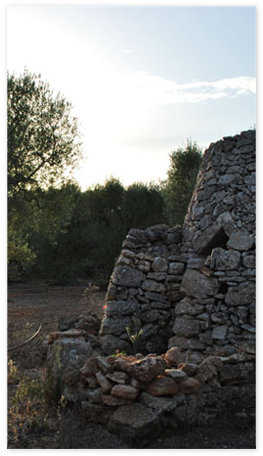Macaria is an idea and project developed by a group of young Salentini who are trying to reconvert the use of the surrounding countryside while respecting and developing the environment in the area using traditional means.
The project is trying to develop a responsible ecological tourism which offers support services that benefit the environment such as the type of accommodation offered and also including the offer of genuine food produce from the area and other similar ideas to help stimulate and renew the local economy .

Our ideas
The whole project has been developed specifically to encourage a turism which does not ruin the countryside but enhances it and helps its development both in the short and long term leaving no permanent environmental damage.
One of our main objectives is the conservation of the Salento countryside, which we see as fundamental for the development of an ecological and biodiverse methods of agriculture for the local economy, including the tourism industry.
Our guests will be able to enjoy their holidays in a real rural area with accommodation which does not have a negative effect on the land and knowing that their stay will help develop both their knowledge of the area and their participation in enjoying a new type of holiday while giving an impulse to a different approach to turism both from the guest's point of view and that of the local area, economy and people.
Local agricultural cultivation has been reactivated using traditional methods which take into account those products which are best grown in this area and without the use of chemicals etc.

Olive growing is the main produce in this area and it is now cultivated without use of chemicals and using organic manure. The extra virgin olive oil produced has returned to its origins and is better, purer and chemical free.

Horticulture is mainly in the field of tomatoes and potatoes but wild herbs are also picked and used in the cosmetic and pharmaceutical industries
Particular attention has been given to the orchards. These are called minor orchards because the type of fruit grown pomegranates, jujube, carob and arbus berry, indian figs and almonds are grown in smaller quantities and hardly ever mass produced. Myrtle, laurel, lentil and caper shrubs are also grown and transformed into produce.
